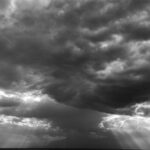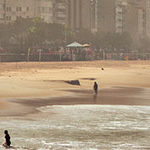Whenever Air Force Master Sergeant Jeremy Lock raises his camera to his eye, he becomes a man on a mission. “You look for the moment, that brief second,” he says, neatly summing up the objective of photojournalism. Lock’s exceptional work with the US armed forces, shot on 40 countries across 6 continents and spanning 2 decades, have earned him Military Photographer of the Year honors a record 7 times:
In the short feature above, Lock talks about what he looks for when he wants to capture war, the sacrifices that come with the profession, and the things that he appreciates about the job. He points out how a military journalist differs from a civilian journalist — in 2006, he earned a Bronze Star for an incident in Iraq where he put down his cameras to pick up a rifle and provide covering fire while others pulled a wounded soldier to safety — while still essentially having the common goal of trying to tell the story as best as they can. He uses Nikon simply because that is what the military issued him, specifically the D700 and D800.
“Whenever I am on assignment, whether its in war or on a local shoot, I carry two cameras, one with a long lens and the other with a wide. And I will have usually a 50mm lens in my pocket. I pride myself with carrying as little as possible to get the job done.”
Towards the end, he speaks about how it will be tough to hang his cameras when the time comes to leave the military (Via The Washington Times & Petapixel). Still, he says will always be thankful for being given the chance to leave a photographic legacy, his mark on this world.
“To truly capture war is to capture it on the face of the soldier next to you.”
“You’re only as good as the last photo you’ve taken.”
Like This Article?
Don't Miss The Next One!
Join over 100,000 photographers of all experience levels who receive our free photography tips and articles to stay current:








MSGT Lock, you’ve been able to show a glimmer of the you’re career within the Air Force. Not only a great production, but you capture,d by your preformance what it means to be a Senior NCO. And at the same time you reflect how war impacts those in the conflict. Yes, not most active duty personnel are pilots and they still have rewarding careers. thank you, MSGT Lock, for you service.
MSgt Lock: What an impressive collection of photos presented in this short video. It’s a great teaching tool for anyone interested in photography. Each photo was a moving and emotional window into the soul of the military men and women who put their life on the line. It’s very clear why you’ve won so many awards.
MSgt Lock: Thanks for your duty and sacrifice, from the images I saw I can understand the 7X Military Photographer of the Year. Lead On!